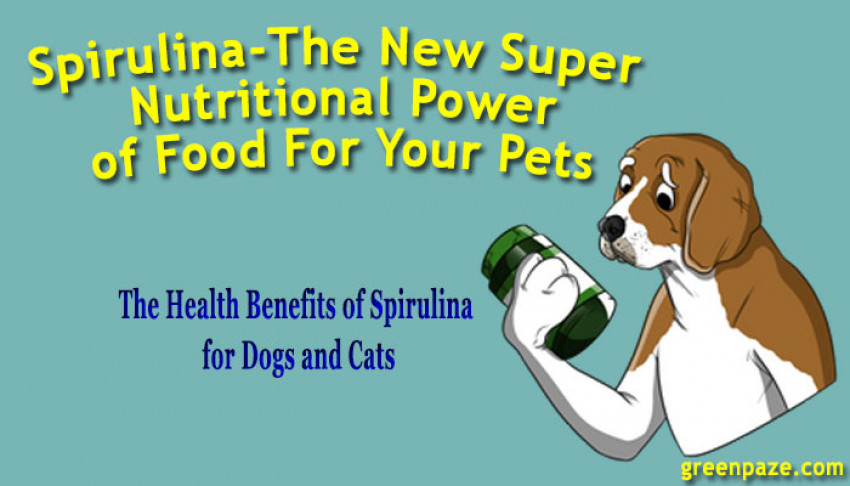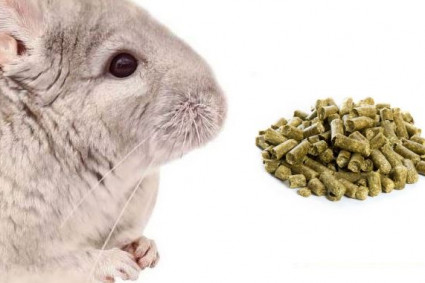
Spirulina-The New Super Nutritional Power of Food For Your Pets
Spirulina is a super food that you cannot miss if you like natural food.
It is consumed by athletes to astronauts and the good news is that it is also very beneficial for dogs and cats.
And not only because it is loaded with nutrients but also because it has properties that can help in different situations.
Before continuing, we want to remind you that, when evaluating any supplement, if your dog or cat has a medical condition, you should consult your veterinarian before adding it to his diet.
Now yes ... we started!
What is Spirulina?
It is a microscopic algae (almost more of a type of bacteria) green-blue in an almost perfect spiral shape, which is what gives it its special name.
It normally grows in fresh water, multiplies easily, and can be purchased as a powder with a dark green hue.
The Super Nutritional Power of Spirulina
Spirulina is one of the foods that contain the most protein.
Between 50 and 70% of its dry weight is very high quality digestible vegetable protein with almost all amino acids.
When compared to soy, famous for its protein content, this only reaches 36% of its dry weight.
Its content in fatty acids is very complete, including Omega 3 and Omega 6, in addition, it is one of the best sources of Gamma-Linoleic Acid (GLA), which constitutes 40% of all its fatty acids (Ciferri 1983).
GLA (Gamma-Linolenic Acid)is rare in common foods and is a precursor to chemical mediators of inflammation and immune reactions.
To prevent the Omega 3 - Omega 6 ratio from being unbalanced, it is always interesting to add fish oil (rich in Omega 3).
It is rich in Sulfolipids, which can help protect against viral infections.
Carbohydrates are 15-25% of the dry weight of Spirulina (Falquet 2006).
In addition, it has the highest levels of Beta Carotene (up to 10 times more than carrot) and minerals such as Iron (much more than spinach), Zinc and Magnesium. As if this were not enough, it contains a lot of chlorophyll, which can act as a cleanser that "detoxifies" the body, among other things, from atmospheric pollution.
With this table, it is not surprising that its use is being studied to treat malnutrition in third world countries.
The Health Benefits of Spirulina for Dogs and Cats
Most studies testing the effect of Spirulina on animals suggest that:
1. Strengthens the immune system and balances the microbiota (Satyaraj 2021)
2. Improves gastrointestinal health
3. Helps to detoxify
4. Reduces the risk of cancer
5. May help with allergies
Spirulina Helps Improve The Defenses of Dogs and Cats
When the immune system is stressed or suffering, it draws on the body's own metabolic energy.
Dogs with an imbalance in the immune system often have chronic fatigue and a lack of energy.
Small amounts of Spirulina can help balance and stabilize it, releasing more metabolic energy and producing more vitality, health and use of nutrients.
In addition, it improves intercellular communication and has the ability to regenerate and repair DNA, which works as a kind of set-up.
Scientists around the world confirm that Spirulina improves the function of the immune system.
And not only that, but it improves the body's ability to produce new blood cells, as well as the cells of the immune system (marrow, macrophages, T cells and Natural Killer cells), have greater activity.
Due to this power to boost immune activity, more and more animal feed producers are adding it to their formulations (Holman, 2012).
Spirulina can also improve gastrointestinal and digestive health.
The Reason?
This algae suppresses harmful bacteria such as e-Coli and Candida and stimulates beneficial intestinal flora such as lactobacillus and bifidobacteria.
A beneficial plant is the foundation of good health, as it increases the absorption of nutrients and protects against infections.
Spirulina Can Act as a Natural Detoxifier and Cleanser
Scientists in Japan significantly reduced kidney toxicity caused by mercury and three pharmaceutical drugs.
Others found in experiments that rats fed Spirulina or Chlorella algae eliminated 7 times more dangerous chemical toxins (Mohamed M. Abdel-Daim) than the group on a control diet.
Its healing effects have even been tested in patients exposed to radiation (Belookaya 1991), reducing radionucleotides by up to 50% and normalizing allergic sensitivities.
Our dogs and cats have never been more exposed to harmful chemicals both in the air and in water, food and medicine. Their bodies need to continually eliminate those toxins.
The fact that Spirulina contains unique combinations of phytonutrients, including chlorophyll, phycocyanin and polysaccharides help to cleanse the body.
Spirulina Can Help in The Prevention and Treatment of Cancer
Its greenish-blue color is more than just a pretty appearance; it is also a source of much of its anticancer preventive effect.
In "Healing with Whole Foods," Paul Pitchford writes that "it is important to note that in the preventative area, spirulina contains the pigment blue phycocyanin, a biliprotein that has been shown to help inhibit the formation of colon cancer."
Spirulina and its extract have shown an anticancer effect in animal studies (Koníčková 2014).
Its positive influence on Natural Killer cells helps control cancer cells, as well as polysaccharides can help restore tissues damaged by the effect of toxins or radiation.
Spirulina contain chlorophyll that helps to prevent skin, stomach, colon and liver cancer, a study showed At the University of Oregon.
Spirulina Can Reduce Allergies
Clinical studies point to the broad spectrum antiallergic effect that this algae could provide.
A study published in 2008 demonstrated an immune modulatory effect in people who took Spirulina for 16 weeks.
Other studies conducted in test tube on animal and human samples suggest that Spirulina can contribute even in cases of food allergies.
These results are very important precisely because allergic flare-ups are caused by exaggerated responses of the immune system to moderate exposures.
This explains why some dogs can react violently to certain pollens or to certain foods and another, under the same circumstances, reacts normally.
How and How Much Spirulina Should Give Your Dog or Cat?
Usually you will find Spirulina in powder form, although it is also available in capsules and other formats, including juices.
According to Animal Essentials herbalist Greg Tilford, it is completely safe to consume every day, but it is so nutrient dense that it can lead to diarrhea if consumed too much.
The daily recommendation for our little ones is the following:
a) 1.25g (half a teaspoon) for small dogs mixed with food
b) 2.5g (one level teaspoon) for medium and large dogs mixed with food
c) 0.5g for cats mixed with food
Can Spirulina Be Given With Feed?
Normally we always recommend the raw natural diet or BARF diet but this supplement is equally valuable if your dog eats feed.
To give it to him, you just have to dilute it a little in water, fish oil or broth and pour it over his food.
What Should You Keep In Mind When Buying Spirulina?
It is important that you look for the purest product you can. Here are some tips:
1. Research the company that sells it to you. It must be accessible, provide your contact details and answer all your questions
2. Find out where it came from.
3. If you can, buy an organic spirulina
4. Ask about the analysis of the product, in particular its pH (it should be above 10) and the presence of heavy metals
When should You Avoid Giving Spirulina?
It is not advisable to include spirulina in the diet of our dogs or cats when they are undergoing anticoagulant treatments or suffer from epilepsy.
If you are looking for a natural supplement that raises almost all the levels of your dog or cat, you have found it.
A totally vegetable and accessible super food to give to your dog or cat every day or when he needs it.




